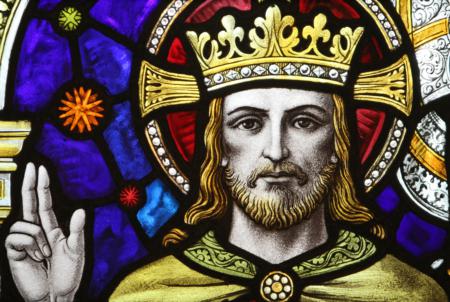The Lord of science
Any atheist can work a miracle, as the catechism teaches. In cases of necessity, it says, anyone can serve as the minister of baptism, if he simply pours water on the candidate, says the Trinitarian formula, and -- this is important -- intends, in doing so, to do what the Church does.
We can quibble over whether a baptism is strictly a miracle. It involves a supernatural work attributable solely to God, the cleansing of the soul. But some have insisted that a genuine "miracle," as its name indicates ("to wonder at"), must involve some observable departure from nature -- which baptism does not (and neither transubstantiation).
But what baptism does clearly show is the difference between doing something from someone else's power, and doing it from one's own. The atheist who baptizes must intend to do what the Church does, because he cannot baptize on his own power. The Church was given that power when the sacrament was instituted. Although it is too much to ask an atheist to "invoke" this power (he's an atheist, after all), he must in some indirect manner rely upon it.
Miracles are beyond us. Saints do not work miracles except by praying to God or implicitly relying on God's power. In the first recorded Christian miracle, Peter and John went to pray; they met a lame man on the way: "In the name of Jesus Christ of Nazareth," they said, "rise up and walk!" A thousand years later St. Francis tamed the wolf of Gubbio with a like invocation: "Come hither, brother wolf; I command thee, in the name of Christ, neither to harm me nor anybody else." Go forward another thousand years, to miracles of the 20th century, and one finds the same thing. Christians work miracles only by invoking the power of God.
Jesus, however, did not invoke anyone else. We take that for granted, but it should continue to astonish us, as it did the early Christians. He did not pray to God for people to be healed or revived. He simply commanded, and it was done: "Lazarus, come out!" "Little girl, get up! (Talitha cumi)" "Child, your sins are forgiven." "I say to you, rise, take up your pallet, and walk!" "Then he got up, rebuked the winds and the sea, and there was great calm." And so on. Demons were cast out, illnesses were healed, and dead people came back to life, because he said so.
Now one implication of this, which we perhaps easily draw, is that Jesus was all-powerful. Every genuine miracle involves some element of creation or annihilation. The loaves and fishes must have sprung into existence immediately in the baskets. The body of Lazarus cannot have been converted from a rotting corpse to a living organism without a process of creation. But only the all-powerful God has the infinite power needed to bring something into existence from nothing, or to reduce being into complete nothingness. Each of those commands of Christ was an act of creation.
Yet the early Christians -- St. Athanasius, for example, in his "On the Incarnation" -- were even more inclined to draw the conclusion that Christ was all-knowing and governed everything. The man who by his command created must be the incarnate Logos, the person responsible for the rationality and design evident in creation. The formula which Athanasius prefers is that Jesus was "the Lord of the providence of the universe."
You can see why Athanasius would say this if you consider, again, the distinction between making something by your own power, and making it by relying on someone else's power. Imagine a man with a withered hand, or no hand at all, and imagine that Jesus approaches him, touches the hand, and the hand becomes restored and whole.
Now, how many bones are in a hand? How are they arranged? What exactly is the musculature like? How are the nerves distributed to produce the refined tactile sensation of the hand? --This is just to ask some questions about the hand in general. But it is a particular hand which needs to be created. -- What will its fingerprints look like? How will the capillaries be constructed? How will the pores and hairs and birthmarks on the skin be distributed. -- But so far this is just a static hand, on a large scale. We need to ask about tissue, cells, and biochemical processes within cells. "The hairs of your head are counted." This particular hand will have a definite number of cells. Each cell with have a different and precise volume. It will consist of a definite number of molecules. Those molecules must be created exactly in the midst of carefully modulated, ongoing biochemical processes.
Remember: there can be no reliance on anyone else or anything pre-existing. Now, it's hard enough for an artist to sculpt the outline of a hand. It's almost impossible to make an anatomically precise model of "the human hand." But infinite intelligence is needed to create a particular hand, functioning and whole.
A person like that we might prefer to call "the Lord of science," following Athanasius: "He was not enclosed in a body, nor was he in the body but nowhere else. Nor did he move the latter while the universe was deprived of his action and providence. But what is most wonderful is that, being the Logos, he was not contained by anyone, but rather himself contained everything."
MICHAEL PAKALUK IS PROFESSOR AND CHAIRMAN OF PHILOSOPHY AT AVE MARIA UNIVERSITY.
- Michael Pakaluk is Professor of Ethics and Social Philosophy in the Busch School of Business at The Catholic University of America. His book on the gospel of Mark, ‘‘The Memoirs of St. Peter,’’ is available from Regnery Gateway.



















